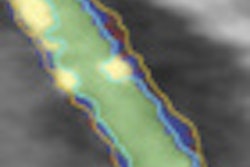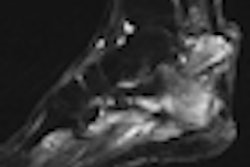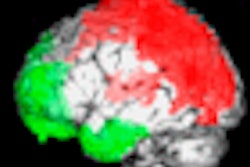NEW ORLEANS - Among apparently healthy people under age 35 at risk of sudden death, negative coronary calcium scores do not necessarily signal the absence of atherosclerotic plaque.
"If you perform a CT scan in young people, a negative coronary calcium score does not exclude the presence of coronary artery disease," said Dr. Cristina Basso, Ph.D., a cardiologist and pathologist at the University of Padua Medical School in Italy.
"Coronary artery disease is a very different disease in young than in older persons," Basso said in a presentation on Monday at the American Heart Association (AHA) Scientific Sessions 2008. "In older adults, you see typical mature plaque with a lipid core and calcium. In the young, there are no lipids at all or very little. There is no calcium or very little."
Instead, coronary artery disease in young sudden-death victims mainly consists of single-vessel disease with exuberant intimal fibrocellular proliferation devoid of lipids, Basso said during her presentation.
In the study, Basso and colleagues first performed autopsies on 483 apparently healthy young people less than 35 years of age who had died suddenly. Only 16% were found to have unstable atherosclerotic plaques.
"For most, sudden death was the first manifestation of their disease," she said.
The researchers then performed postmortem ex vivo 16-slice CT (LightSpeed Plus, GE Healthcare, Chalfont St. Giles, U.K.) on 60 consecutive young sudden-death victims with atherosclerotic coronary artery disease (mean age, 31 years). For comparison, multidetector CT was also performed on 20 consecutive older patients with atherosclerotic coronary artery disease (mean age, 59 years).
Seventy percent of the young coronary sudden-death victims had single-vessel disease versus 20% of the older patients. Fibroatheromasic plaques with lipid core were present in 42% of younger patients versus 100% of the older patients.
Coronary calcium was detected by multidetector CT in just 20% of the younger patients, compared with 65% of the older patients (p < 0.0001).
"Among the young sudden-death victims, a positive coronary calcium score was exceptional in people under 30 years [4%] as compared to people over 30 years [32%]," Basso added.
"Coronary calcium scores, as assessed by CT, are a strong predictor of coronary artery disease extent and increases with age," she said. "But it is ineffective as a noninvasive test for predicting asymptomatic plaque in apparently healthy young people at risk of sudden death."
By Charlene Laino
AuntMinnie.com contributing writer
November 11, 2008
Related Reading
Autopsy study confirms low prevalence of adenomas in youth, October 14, 2008
Coronary calcium increases mortality risk in elderly, July 23, 2008
Coronary artery calcium better predictor than carotid IMT of cardiovascular events, July 9, 2008
Novel calcium scoring method may improve prognosis, June 16, 2008
Coronary calcium still matters, May 26, 2008
Copyright © 2008 AuntMinnie.com



















